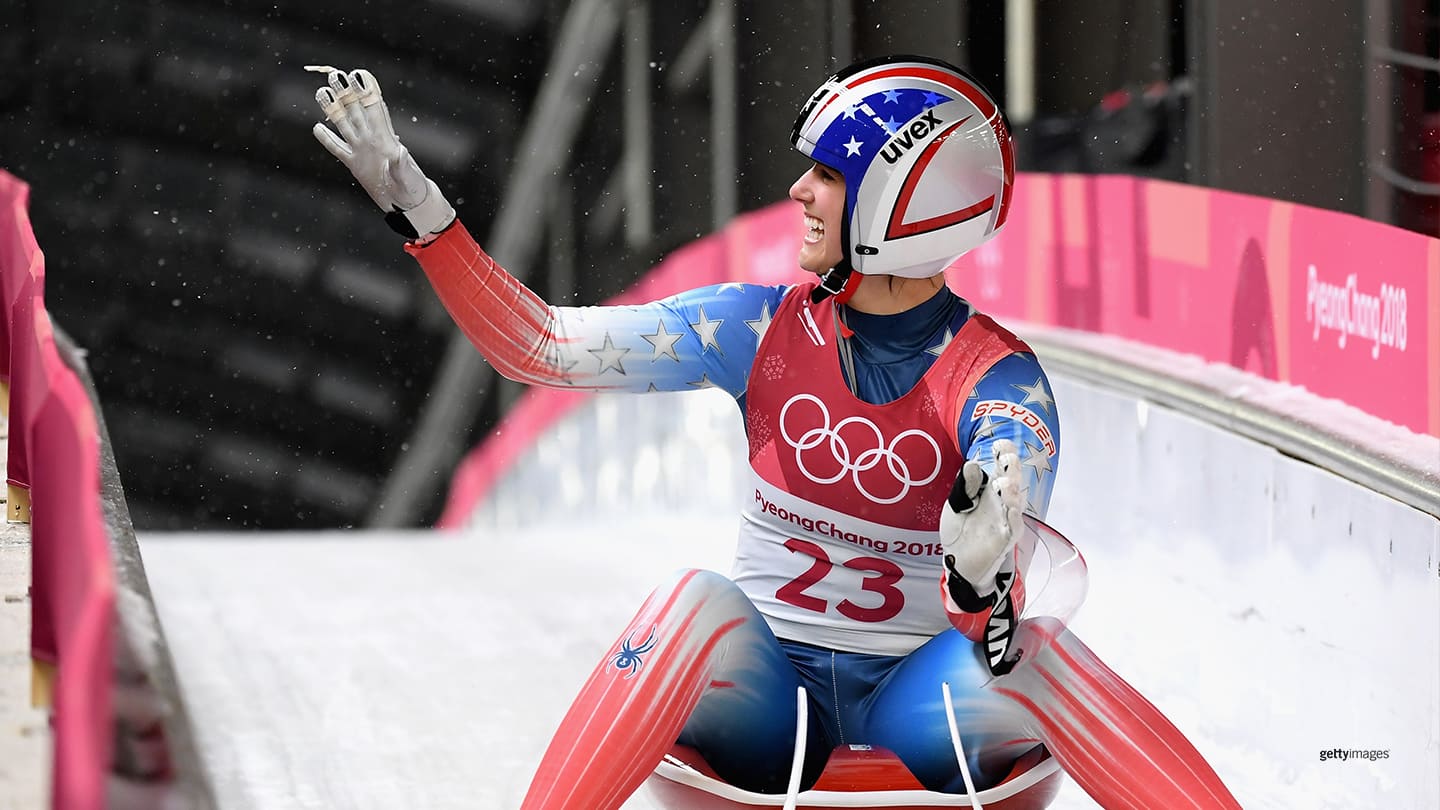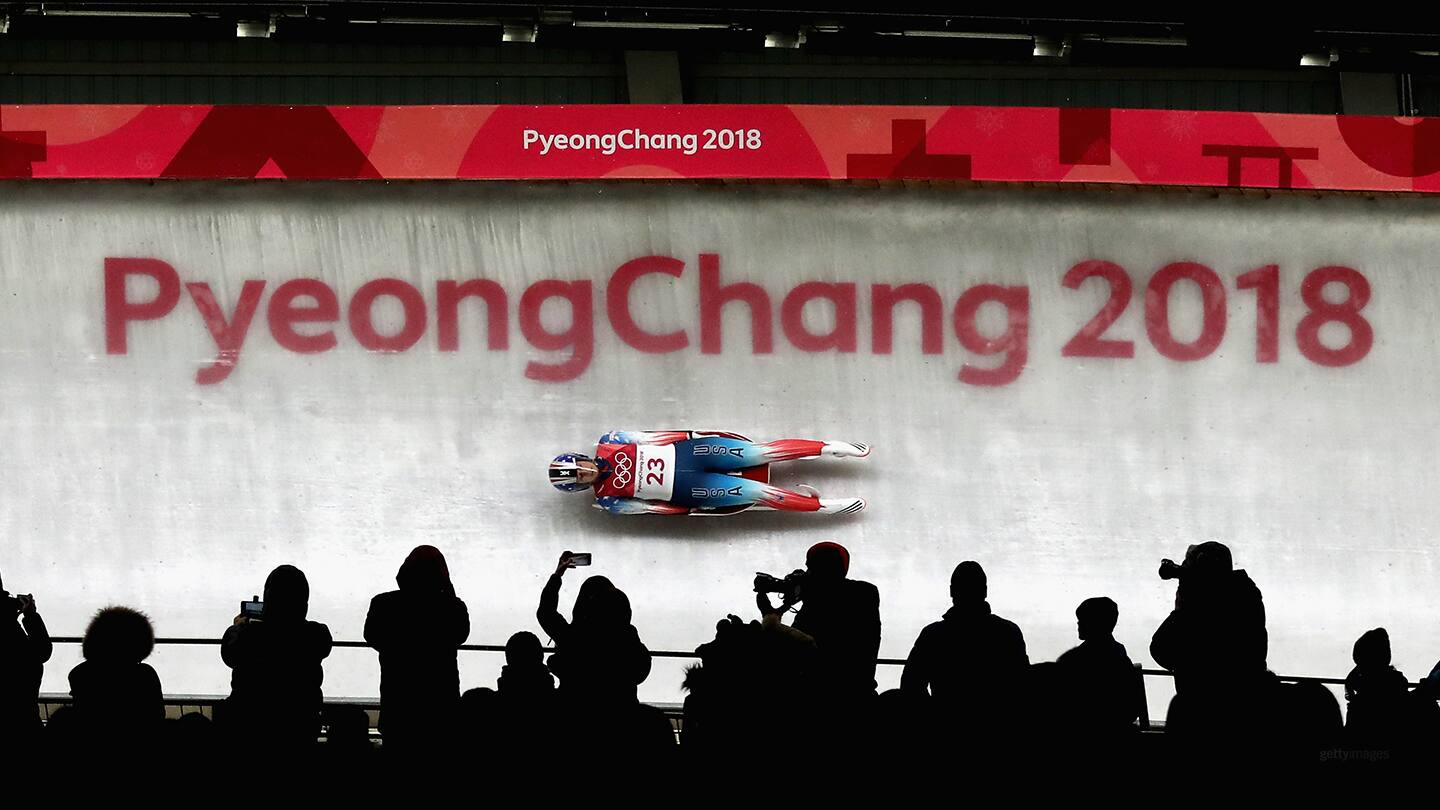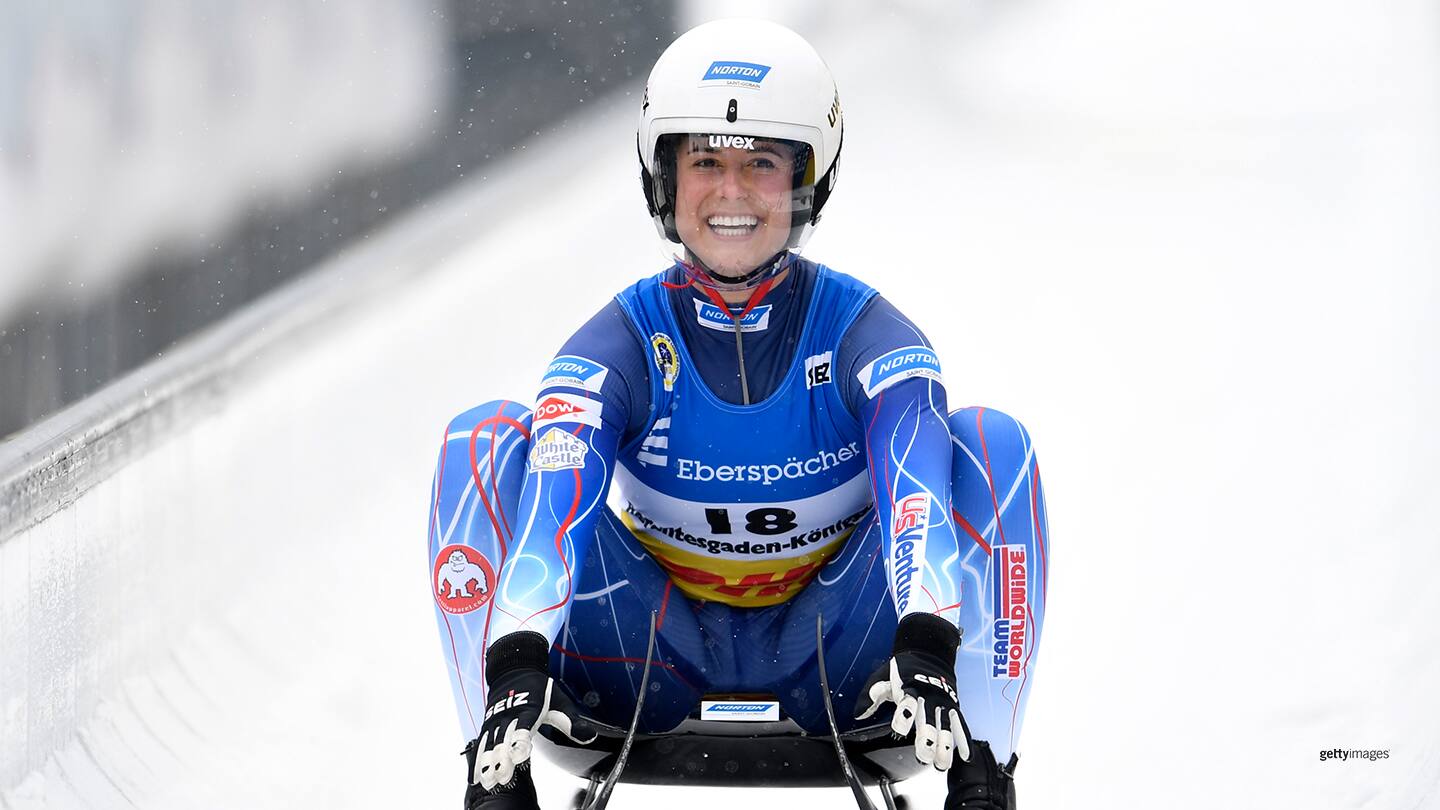
The 2022 Olympic Games Are About More Than Unfinished Business For Luger Emily Sweeney
by Peggy Shinn

Emily Sweeney reacts following the women's luge singles run 3 at the Olympic Winter Games PyeongChang 2018 on Feb. 13, 2018 in Pyeongchang-gun, South Korea.
Last week, Emily Sweeney won USA Luge’s selection races and will begin her 13th year competing in FIL World Cup races when the tour opens on Nov. 20. For the 28-year-old slider, it’s a step toward qualifying for her second Olympic team.
But Sweeney — who had a bad crash in her final run at the Olympic Winter Games PyeongChang 2018 — is not looking to complete unfinished business at the Olympic Winter Games Beijing 2022.
“I’m still learning,” she said during an interview at USA Luge’s headquarters in Lake Placid, N.Y., earlier this fall, her trademark smile hidden behind an N95 mask. “I still feel like there’s more to learn, and I’m still enjoying it.”
Her goal is to win an Olympic medal in luge — but not just for herself.
“I want it for everyone who’s helped me on this crazy journey,” she said. “I don’t need it for validation.”
Sweeney’s journey is inspirational, not for the medals she has won (and she has won many), but for her perseverance. For this is not the second time that she has tried to qualify for a U.S. Olympic Team. It’s her fourth.
Inspired by older sister Megan, who was on USA Luge’s national team, Sweeney first tried luge at age 10 at a USA Luge slider search. Within a few years, she was competing in junior world cups — and a few senior world cups as well. She had a podium finish on the junior world cup leading up to the 2010 Olympic Winter Games. But the final spot on the 2010 U.S. Olympic team came down to a race-off — with her sister Megan, who earned the spot.
Sweeney was only 16 at the time and figured her time would come. Over the next few years, she won more junior world cup medals — and joined the U.S. Army, becoming part of the World Class Athlete Program. In 2013, at the age of 19, she became junior world champion.
But when the Olympic Winter Games Sochi 2014 came along, Sweeney again found herself on the sidelines. She had issues with her sled and was contending with minor injuries. Three American women qualified to represent Team USA in Sochi, including Erin Hamlin, who won an Olympic bronze medal at those Games. Sweeney was not one of them.

Emily Sweeney slides during the women's luge singles at the Olympic Winter Games PyeongChang 2018 on Feb. 13, 2018 in Pyeongchang-gun, South Korea.
“I think part of it was some baggage from 2009-2010,” she said. “It just didn’t come together. I mean, we’re in a sport that’s timed to one-thousandth of a second, so the smallest variable really impacts results.”
Sweeney “shut down” her luge career at that point.
“I was really at a point where I said, 'What's the point? What's the point of doing this if I'm not getting the results I'm wanting?'” she told the Army News Service in 2018. “It took a while, I closed myself off.”
In May 2014, she received orders to attend a month-long military leadership course. It “kicked me back into gear,” she said.
Over the next Olympic quad, she landed on the world cup podium more regularly. In 2018, she was named to her first Olympic team. Her primary emotion was relief; she could now call herself an Olympian. And when your career is luge, that matters.
“Outside of the Olympics, no one [in America] really sees luge,” she said. “So when someone on the street asks what you do, you say, ‘I’m on the luge team.’ Then they ask, ‘Did you go to the Olympics?’ That’s the first thing they ask because that's the only association they have with luge.
“The weight of not being able to say yes when I had been around it for so long and tried so many times, that was always hanging over me.”
But then in early January 2018, her beloved grandfather passed away. A U.S. Navy veteran, he had inspired her to join the military after high school graduation, and the two were very close. Sweeney was in Europe competing on the world cup tour when he passed. It was hard for her to be away from family.
“I didn’t know how to handle it,” she said.
The PyeongChang Games were rapidly approaching, so she stayed (literally) on track. But her consistency fell off. In the final world cup before the Games, she was sitting fourth after the first run, but ended up 21st.
Then on the Olympic track in PyeongChang, Sweeney went into her fourth and final run sitting in 16th place. Halfway down the track, in a tricky corner, she bounced against the wall, ricocheted to the other wall and turned sideways. Although she walked away from the crash, she had fractured her neck and spine.
Recovering that summer, Sweeney felt frail and unmotivated. In the coming season, she would need to finish on the podium to maintain her team status, and that prospect felt “so unreal,” she said, “like a joke.”

Emily Sweeney reacts after her second run in the women's luge singles at the 2021 FIL Luge World Championships on Jan. 31, 2021 in Koenigssee, Germany.
One day about six months after the accident, she went for a walk with one of her coaches. She asked if he thought she could do it. Yes, he replied, and she believed him.
“He actually took time to think about it,” recalled Sweeney. “He didn’t just give me a knee jerk reaction and say, ‘Yeah, of course you can do it.’ He thought about it.
“That’s when things changed for me.”
Despite still struggling with her neck and back, Sweeney scored several top-five world cup finishes that season. Then at the 2019 world championships, she won a bronze medal.
“After that season I asked my coach how he had said yes to me,” she said. "He once again thought about it and said he just knew what I was capable of, he knew what my skill was, and he just believed I could do it.
“I don’t think I could have won those medals that season without that conversation.”
Sweeney earned even more world cup medals during the 2019-2020 season but then had to stop early due to more neck issues. The COVID-19 pandemic derailed half of last season, and when USA Luge athletes finally did compete, they struggled to be competitive with their European counterparts who had raced the whole winter.
“It felt like everyone was on solid ground, and you’re running on sand or something where you just don’t have your footing yet,” said Sweeney.
But Sweeney still finished seventh at 2021 world championships in late January.
It was, she said, the best performance she had ever had at a race. Her starts were on point, and coaches from other countries commented on how well she was sliding.
“I didn’t have the result to show for my performance,” she said. “But I’m really proud of it. And that was in spite of all the madness.”
Sweeney has brought that performance — and good physical health — into the 2022 Olympic year. The season opens on the 2022 Olympic track in Yanqing, China, in late November.
But she has nothing to prove.